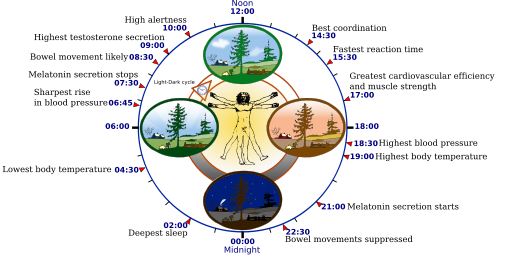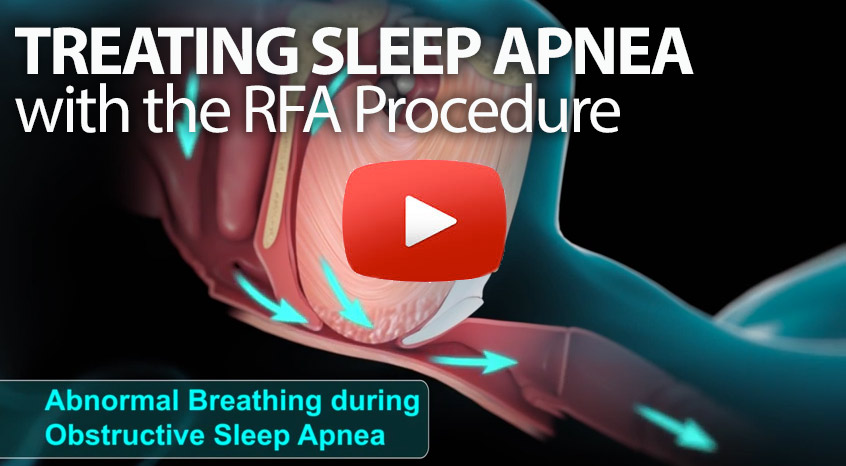What’s keeping us from sleeping?
The New Yorker’s science section published an interesting series of articles on sleep. According to the world’s leading sleep experts, Americans as a population are sleeping less now than we ever have. Our circadian clocks are built-in mechanisms that automatically and unconsciously tell our bodies and minds to turn off, go to bed, sleep and recharge. The circadian rhythms in our lives are being disrupted.

Biological clock affects the daily rhythm of many physiological processes. This diagram depicts the circadian patterns typical of someone who rises early in morning, eats lunch around noon, and sleeps at night (10 p.m.). Source: Wikipedia
We’re simply not sleeping enough!
Over the past five decades our average sleep time on work nights has decreased by an hour and a half, down from eight and a half to just under seven hours. Thirty-one percent of us sleep fewer than six hours a night, and 69% report insufficient sleep. Over the past 100 years, children have lost on average about one minute of sleep per year; children today have lost over an hour and a half of sleep per night since 1905. That’s astounding!
Why aren’t we getting enough sleep? The problem isn’t that people are waking up much earlier. It has to do with when we go to bed, the disruptions in our sleep patterns and the distractions that keep us from falling asleep.
Genetics plays a significant role in our ability to sleep well—or not. “Sleep genes” have been isolated in studies of fruit flies. Abnormalities in these sleep genes can adversely affect one’s innate ability to be a “good sleeper.” Melatonin is a hormone naturally produced by the body to send a signal that it’s time to sleep. Its production can be affected by unusual work schedules and disruptions in the circadian rhythm.
Sleep Hygiene
However, the most significant contribution to insomnia, difficulty staying asleep, and maintaining adequate amounts of sleep has to do with “sleep hygiene”—external and theoretically controllable factors which assist or hinder our ability to sleep.
Sleep hygiene encompasses a number of factors including: the time we elect to go to bed, and the regularity of repeating that bed-time on a regular basis; the ingestion of substances which can affect our sleep including caffeine, alcohol, and nicotine—all of which adversely influence sleep. A diet which can promote acid reflux can adversely affect sleep. The time in which we eat the dinner meal can affect sleep. A variation in the sleep schedule can negatively affect sleep, and this was felt to be one of the most important factors affecting sleep. A regular sleep schedule is a predictor of better grades and improved mood.
Light is your enemy; is it keeping you awake?
Exposure to light affects our sleep in significant ways, and of course with the advent of electricity, we are exposed to more and more artificial light compared to those living in the mid 19th century. Photoreceptors in the eye affect and control our internal clock, and prolonged exposure to light in the evening hours delays the signal to go to bed. 90% of Americans use electronic devices which emit short-wave spectrum light, sending signals to our circadian control center that we should stay awake. These light-emitting devices, including cell phones, televisions, lap tops, and e-readers stimulate the mind, decrease melatonin production and further postpone bedtime and sleep. One study suggested that our sleep can be affected by up to 6 time zones if we are exposed to artificial light. Even limited exposure to artificial light can adversely affect our sleep patterns.
Light can be your sleep partner
Sleep can be facilitated by using light to our advantage. By minimizing short wavelength light, and increasing our exposure to longer wavelength light as the evening approaches, we send signals to our circadian center to increase melatonin production and prepare our minds for sleep. Special filters can be placed on electronic devices to filter out the short wavelength light during evening hours. Exposure to similar wavelength light during the day helps to keep us awake. Astronauts are challenged with the sleep-wake cycles, and light systems are being utilized on the international space station to assist with a more natural circadian rhythm to facilitate sleep.
Are sleeping pills the answer?
It is only natural that the frustrated insomniac turns to sleeping pills. However, these pills can suppress REM sleep and slow-wave sleep- critical time periods during which sleep has the most restorative properties. Decreasing the restorative phase of sleep adversely affects sleep quality and the rejuvenation we all crave from a good night’s sleep. Some feel that sleeping pills add only 30-40 minutes of sleep over the non user. The effects of environmental overstimulation may not be offset by the sedative intentions of sleeping pills. Addressing sleep hygiene probably has a more beneficial affect than using sleeping pills to compensate for poor sleep hygiene patterns.
Adjunctive measures to improve sleep
Cognitive behavioral therapy, a specific form of therapy used by psychologists, can be used to improve sleep. Meditation, tai chi, yoga, and other forms of exercise can also be helpful to positively influence sleep patterns and quality.
Click here to learn more about the factors that affect your quality of sleep—and, in turn, your levels of happiness and productivity during the day.
If you or someone you know is in need of a better night’s sleep, contact us for a no obligation consultation. We are the sleep specialists at Chevy Chase ENT located in the Virginia, Maryland, and Washington D.C. metro area dealing with sleep apnea and sleep-related problems. We can help diagnose your condition, recommend whether a sleep study would be beneficial, and offer you a variety of treatment options including CPAP, Radio Frequency Ablation (RFA) and more.
